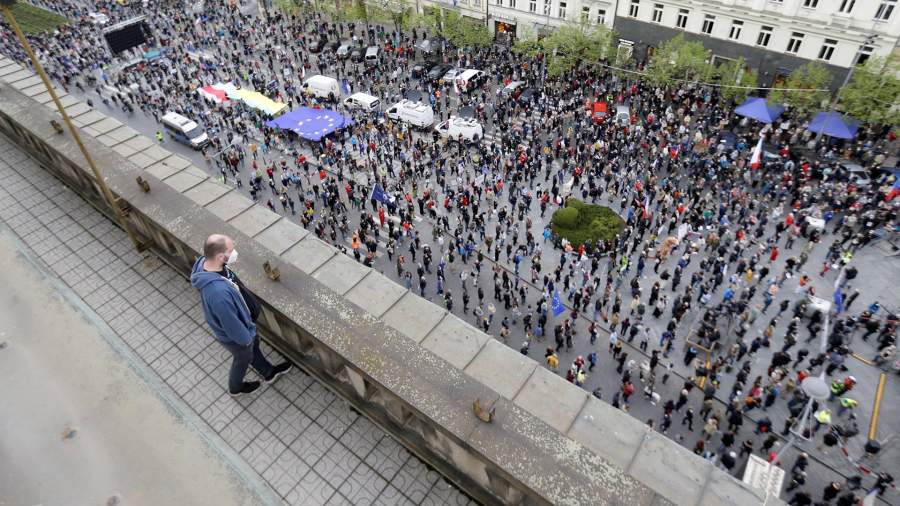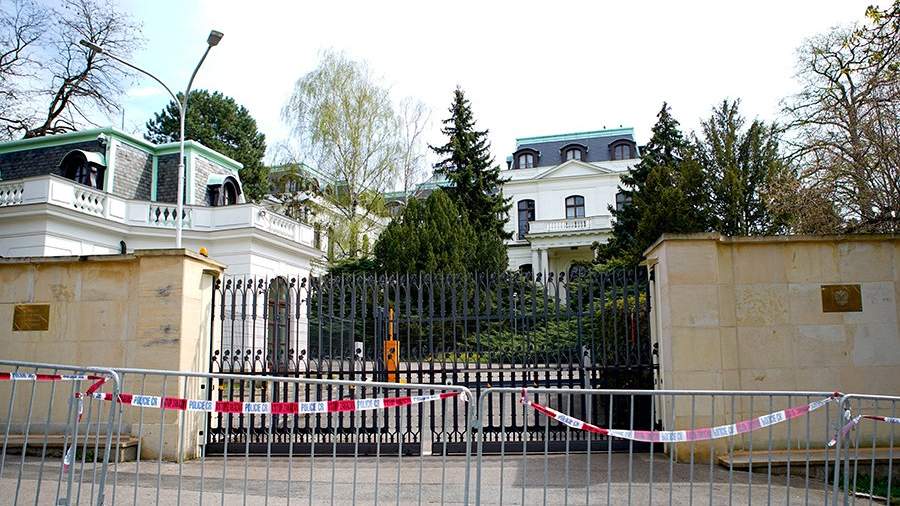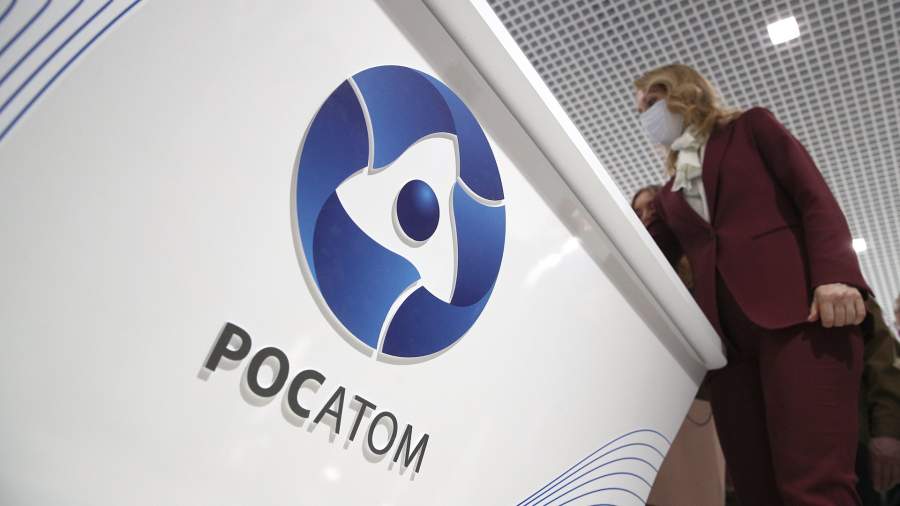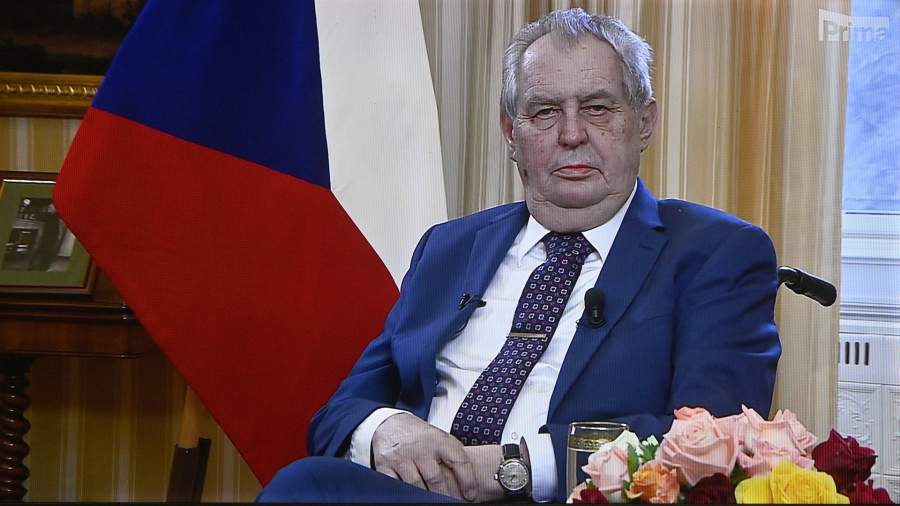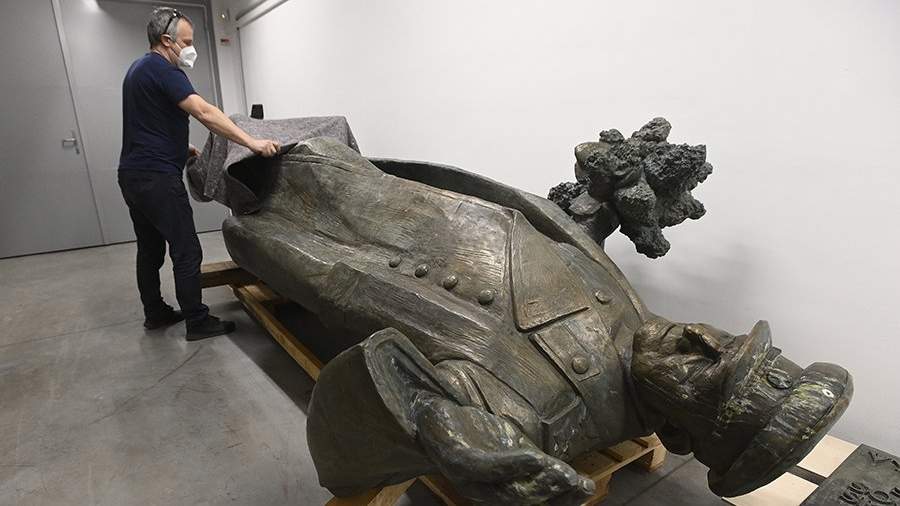A large-scale protest rally against Czech leader Milos Zeman took place in Prague. The demonstrators accuse the president of treason and demand that parliament make a statement. The reason for the criticism was Zeman’s words about the lack of data on Russia’s involvement in the explosions of ammunition in Vrbetica… Izvestia was investigating why the situation in the Czech Republic was heating up.
Table Of Contents
“Pro-Russian President”
A massive protest action took place in the Czech capital on Wenceslas Square. About 10 thousand people took to the streets. The rally of opponents of President Milos Zeman was led by the organization Million Moments for Democracy, which is closely associated with the right-wing parliamentary opposition. In their hands, the activists held posters with slogans insulting the president. Zeman was accused of treason and demands for his immediate resignation from the post of head of state. The demonstrators noted that the main reason for the protest was the “pro-Russian position” of the Czech leader during the acute crisis in relations between Prague and Moscow.
Speakers at the rally stated that “Russia poses a threat to the national security” of the country. They also supported the exclusion of the Russian state corporation Rosatom from the list of bidders for the construction of a new power unit at the Dukovany NPP.
Meanwhile, in the Czech Republic, signatures are being collected for a petition to the Senate demanding a constitutional complaint against President Zeman for treason. One of the main initiators of this appeal was the former Minister of Culture Michal Kotsab.
Prague vs Moscow
A diplomatic scandal between Moscow and Prague erupted on April 17. It all started when Prime Minister Andrei Babis accused Russia of involvement in the explosions at an ammunition depot in the village of Vrbetice, which occurred back in October 2014. Then two people died. The investigation stated that the explosions could have been organized by alleged GRU officers Anatoly Chepiga and Alexander Mishkin (they are also known as Alexander Petrov and Ruslan Boshirov); in their opinion, the Russian special services were planning a sabotage in Bulgaria, where they were supposed to deliver these ammunition for subsequent shipment to the east of Ukraine.
It was decided to expel 18 Russian diplomats from Prague. Moscow responded by declaring 20 Czech diplomatic officers persona non grata. Then the Czech Republic issued an ultimatum: either Russia will return the employees of the diplomatic mission expelled from the country, or the Czech Republic will leave only five people in the Russian embassy in Prague. Moscow did not agree to the deal, the Kremlin hinted that it was “futile to talk with Russia in the style of demands,” and 60 employees of the Russian embassy were returned to their homeland from Prague. And the Czech Senate called for the termination of the treaty on friendly relations with Moscow.
At the same time, a large-scale raid was carried out in the Czech Republic. They detained five local activists who are suspected of working for the Russian special services. The investigation believes that they once traveled to Ukraine and participated in battles in the DPR and LPR on the side of the forces of the unrecognized republics. As a historian and political scientist living in the Czech Republic Pavel Prilutsky clarified in an interview with Izvestia, it was not the Russian-speaking residents of the republic that were detained, but the Czechs. Now they face up to 15 years in prison. “There is a feeling that the Czech authorities want to show their citizens that it is dangerous to contact Russia. Now about 10-15% of the population has sympathy for Moscow“, – explained the interlocutor of the publication.
Deals are thwarted
In the midst of the conflict, a big potential deal fell through: Rosatom was excluded from participation in the tender for the construction of a new power unit for another nuclear power plant, Dukovany. And the Czech energy company ČEZ has decided to choose another supplier of nuclear fuel for the Temelin NPP reactors for the next 10 years. Previously, this was done by the Russian company TVEL (the fuel division of Rosatom).
“Considering that the Dukovans were built back in the USSR, it is obvious that Rosatom had a good chance of getting this tender. And recently, the Czech Ambassador to the United States, Petr Gandalovich, openly said: the Americans are faced with the task of preventing Russians from participating in the tender for the expansion of the nuclear power plant. A similar situation is in Bulgaria – the United States was unable to build a nuclear power plant there, but prevented the participation of Rosatom, – Natalya Sudoenkova, a journalist and publicist from the Czech Republic, told Izvestia.
According to the expert, the decision to exclude the Russian company from the tender was condemned by 27% of the Czechs surveyed, while over 70% supported this step, saying that Russia should leave the republic’s nuclear energy market.
Before the diplomatic scandal, First Deputy Prime Minister Jan Hamacek was going to Moscow, where he was supposed to discuss possible deliveries of Sputnik V to the Czech Republic. However, on April 29, it became known that the Czech pharmaceutical regulator suspended the study of the Russian vaccine against coronavirus.
Sudoenkova notes that in the Czech Republic there are suggestions that they went to aggravate relations with Moscow due to the fact that some forces are interested in disrupting the supply of the Russian drug from the coronavirus. The journalist agrees that the issue of vaccine supplies plays an important role, but at the same time believes that the issue is not Sputnik, but the tender for the nuclear power plant. “Its cost is much higher. The amount of investments in the expansion and completion of the Dukovany NPP is about $ 6 billion, ”she explains.
Different reasons
Czech President Milos Zeman tried to smooth over the contradictions in relations with Moscow. He appeared on local television on April 25 with sensational statements. The head of state urged to consider two versions of the cause of the explosion at the ammunition depot. One – where “Russian agents” are accused, the second – according to which the reason for what happened was the careless handling of ammunition in the warehouse. “I can state that the report of the Security and Information Service says that there is no evidence or evidence that these two agents were in Vrbetica,” the Czech leader said, thereby making it clear that Prague has no precise evidence of the involvement of Russian special services.
The President noted that there are many blank spots in the explosions case. “The investigation continues to be carried out by the police and the Prosecutor General’s Office, to whom I have full confidence,” the head of state noted, urging not to classify the results of the investigation, but to publish them openly. In any case, the Russian authorities insist that the accusations against the Czech Republic are “unfounded and unfounded.”
Tougher than Brussels and Washington
In the past few years, relations between Moscow and Prague have been, to put it mildly, uneven. Last year, in the Czech capital, it was decided to dismantle the monument to Marshal of the Soviet Union Ivan Konev. In response, the Czech media reported that Russia decided to take revenge on the initiators of the demolition of the monument and allegedly sent a spy with a diplomatic passport and a suitcase with ricin poison to Prague. The Russian embassy denied all charges. In response, the Czech Republic expelled from Prague two employees of the Russian embassy. Moscow declared two Czech diplomats persona non grata.
After that, it seemed, relations began to improve, notes Natalya Sudoenkova. “How suddenly the current conflict has flared up has surprised many Czechs. It should be noted that parliamentary elections will be held in the fall. Many Czechs still think Russophobic, so anti-Russian rhetoric is just right – it will help to gain the sympathy of the electorate. I do not exclude the rupture of diplomatic relations between the countries. But I would like to believe that this will not happen, ”she added.
The Czechs themselves do not fully understand what caused such harshness and urgency, the situation is changing very dynamically, political scientist Prilutsky is sure. “The Czechs always remember the Soviet tanks of 1968, but nevertheless, in the last three decades after the collapse of the USSR, they behave with Russia quite pragmatically, considering the country as a promising market. Usually Czechs are looking for compromises. Now confrontation is taking place at the level of the Czech government, and this is also not typical for Czechs. Various political forces in the Czech Republic periodically tried to aggravate relations, but everything happened at a niche level. The authorities did not succumb to anti-Russian phobias and tried to pursue a pragmatic policy, ”the expert notes.
At the same time, the Czech ruling elite has different views on how to build relations with Russia. If President Milos Zeman is generally inclined towards dialogue with Moscow, then Prime Minister Andrei Babis usually criticizes her harshly.
According to Prilutsky, there is another non-obvious fact: the Czechs have always been irritated by the fact that the Russian embassy in Prague is much larger than the Czech one in Moscow. “The idea has been promoted for many years that Russian diplomats are the Kremlin’s agents of influence. But these conversations did not develop. There was also a “housing scandal”: then the Czechs allegedly found incriminating evidence against the Russian embassy and announced that the employees were renting out the housing of the diplomatic mission to unknown people. The scandal was hushed up, but now, together with other claims against Russia, they remembered again, ”the political scientist said in an interview with Izvestia.
The expert notes that the Prague mayor’s office also demands to give it part of the Stromovka park, on the territory of which the Russian embassy is located. The territory is large – half a hectare of land. The Czechs would like to return this park to themselves, claiming that Moscow occupied the territory illegally – after the introduction of troops in 1968. “The attempt of the Czechs to speak with Moscow in the language of ultimatums is striking, while realizing in advance that Russia will take retaliatory steps. It seems that through these ultimatums Prague wants to equalize the positions of the countries. But it looks strange and naive. Czechs have always tried to maneuver between Russia, the EU and the United States. But now they are pushing forward for some reason. Perhaps this is due to the election of Biden as president of the United States and the course of aggravation with Russia. But the Czechs are taking this course harder than Brussels and Washington.“- the political scientist notes.
